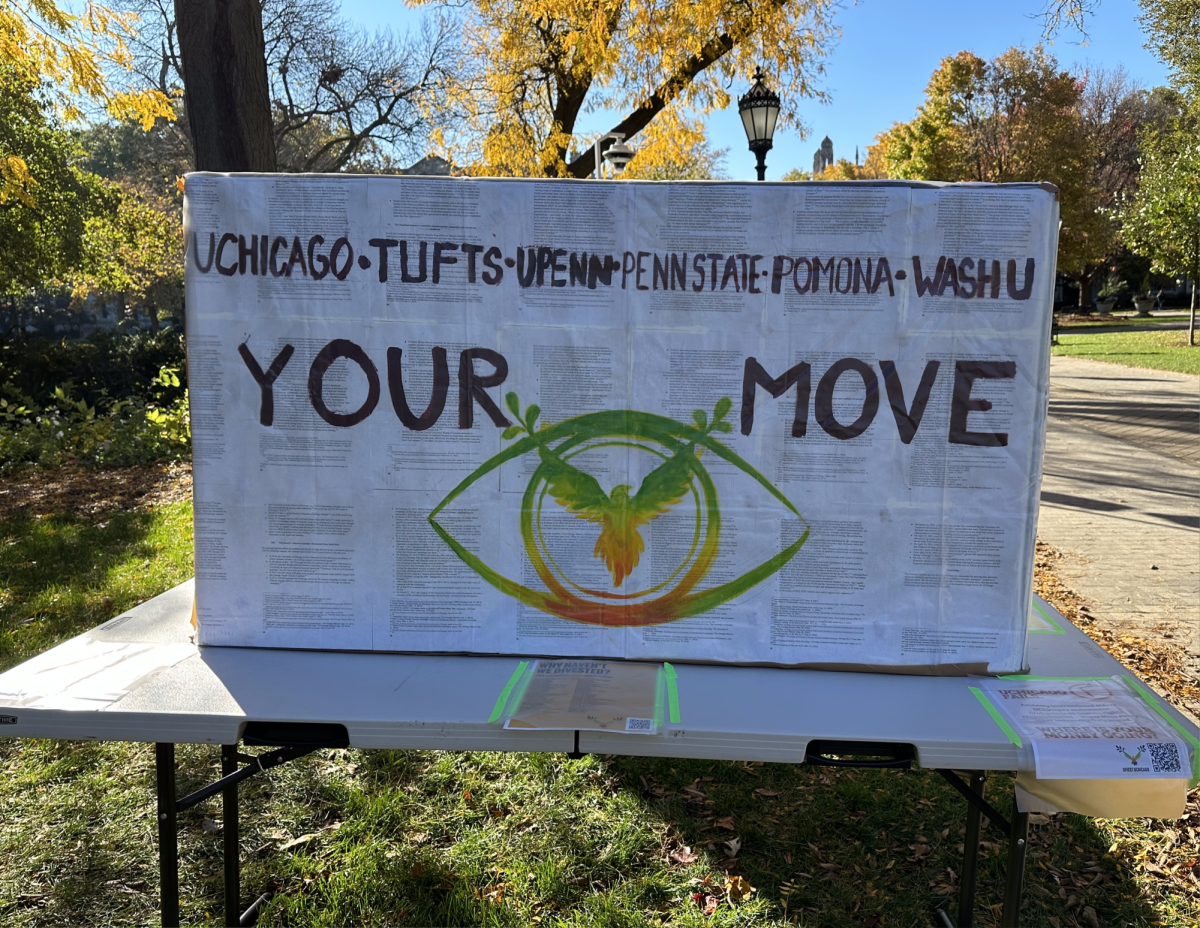On October 30, the UChicago Environmental Justice Task Force (EJTF) filed a divestment complaint against the UChicago Board of Trustees for their investment in fossil fuel enterprises.
The complaint, filed with Illinois Attorney General Kwame Raoul, alleges that the Board violated Illinois law by ignoring its “fiduciary duty to invest with consideration for the University’s charitable purposes.” More than 50 faculty members and 51 organizations have signed the complaint in support.
The complaint asserts that Attorney General Kwame Raoul is “responsible for ensuring that charitable assets are allocated appropriately and for investigating charitable manager’s violations of fiduciary duties.” EJTF requested that the Attorney General investigate the grievances outlined in its complaint and take legal action against the Board if they are found in violation of Illinois law.
This action aligns with a growing trend of climate-focused criticism directed at universities. Last spring, the Fossil Free 5—a coalition of student groups at Vanderbilt University, the Massachusetts Institute of Technology, Stanford University, Yale University, and Princeton University—filed legal complaints with their respective states’ attorneys general accusing their institutions of violating state laws governing how endowments are invested.
EJTF is a member of the Solidarity Six, a group composed of peer organizations at Pennsylvania State University, Pomona College, Tufts University, the University of Pennsylvania, and Washington University in St. Louis. The group’s legal complaints mirror those filed by the Fossil Free 5, which cited the Uniform Prudent Management of Institutional Funds Act (UPMIFA). Every state in the U.S. has enacted some iteration of UPMIFA except Pennsylvania, which has a similar regulation named the Pennsylvania Prudent Investor Rule.
According to Illinois’s version of UPMIFA, charitable institutions like the University must manage their funds based on their organization’s mission and “act in good faith, with the care that an ordinarily prudent person in a like position would exercise under similar circumstances.”
The Board of Trustees, a charitable corporation founded in 1890, acts as the governing body of the University of Chicago. Per its charter, it is responsible “for the proper management of the educational, fiscal, and other affairs of said corporation, and for the care and investment of all moneys and property belonging to it, or given or intrusted to the said corporation for educational or other purposes.”
The complaint filed by EJTF argues that the Board’s fossil fuel investments directly oppose the University’s core values, thus violating UPMIFA.
“The current and future effects of climate change jeopardize the physical integrity of Chicago area infrastructure and the safety of UChicago students, faculty, and staff, undermining the Trustees’ charitable purposes. By investing in companies disproportionately responsible for the climate crisis, the Trustees expose the UChicago community to severe injury, thus failing to act in UChicago’s best interests and violating the duty of loyalty.”
The Board has a history of rebuffing or ignoring claims made by campus environmental activist groups, beginning with the University of Chicago Action Network (UCAN) in 2010. Despite student referendums, climate strikes, and investigative reporting, then University president Robert J. Zimmer announced in 2015 that “the board [was] unlikely to want to [divest].”
UCAN’s divestment campaign ended in 2017, and there were no major pushes for divestment until EJTF launched its own effort in 2021. That same year, President Paul Alivisatos reaffirmed the University’s position and said it had no plans to divest from fossil fuels.
The complaint also frames the University’s decision to invest in fossil fuels as a risky financial decision unsuited for an endowment. “The Board has violated its duty of care by investing the University’s endowment in financial risk and volatile fossil fuel stocks, which have underperformed the broader market for a ten-year period and face a decidedly negative long-term outlook,” according to the report.
Since the University has never publicly confirmed the total value of its holdings in fossil fuel companies, EJTF looked to peer institutions to create a benchmark estimate. “Using the low end of the ranges from Harvard and Rutgers, two percent of UChicago’s $10.3 billion endowment invested in fossil fuels puts the conservative estimate at 206 million dollars. The real value may be much higher.”
EJTF also alleges that several Trustees are in dereliction of their duty to remain impartial on decisions and are in violation of the Board’s conflict of interest rules because of their professional ties to fossil fuels. The complaint names 18 members of the Board, including Chairman of the Board David M. Rubenstein, and highlights their respective involvements.
The majority of highlighted board members are not directly tied to the fossil fuel industry. Instead, they are flagged for investments companies they oversee have made in the industry or for their respective companies’ relationships with the industry.
Despite the University’s reluctance to address its fossil fuel investments, several of its peer institutions have made commitments to create sustainable investing portfolios. These include Harvard University’s total divestment, Princeton University’s vote to dissociate from 90 fossil fuel companies, and Columbia University’s formal disclosure of having no direct oil or gas investments. Similar commitments have been made by Dartmouth College, Brown University, Boston University, Cornell University, and Georgetown University.
Divesting from fossil fuels is not the only area in which UChicago’s investment practices have drawn criticism. In April, the University scored zero points out of 40 in an Amnesty International report grading institutional endowments’ compliance with the United Nations’s Guiding Principles of Human Rights. Recently, a group of students supporting Palestine has called on the University to divest from Israeli companies and arms manufacturers.
“The UChicago administration’s silence on this issue shows that their sole line of defense—abiding by ‘legal investment practices’—has crumbled, and that they are afraid. We will not take silence for an answer, just as we will not take complicity in the climate emergency as an answer. EJTF will continue to put pressure on admin to end their silence and commit to divestment and transparency,” read a statement from EJTF to The Maroon.















